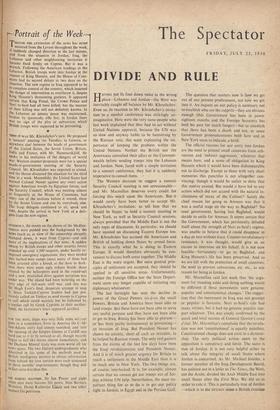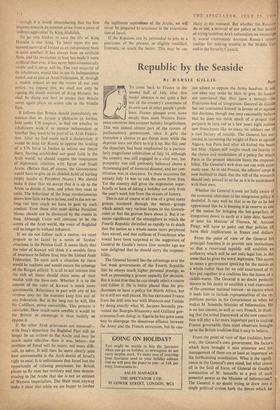DIVIDE AND RULE
HAVING put its foot down twice in the wrong place—Lebanon and Jordan—the West was inevitably caught off balance by Mr. Khrushchev, Even so, its reaction to Mr. Khrushchev's invita- tion to a summit conference was strikingly un- imaginative. Here were the very same people who last week explained that they had to act without United Nations approval, because the UN was so slow and anyway liable to be hamstrung by the Russian veto, this week explaining the im- portance of keeping the problem within the United Nations. Neither the British nor the Americans consulted their allies or the Common- wealth before sending troops into the Lebanon and Jordan. Now, faced with a simple invitation to a summit conference, they feel it is suddenly imperative to consult them.
The Western decision to suggest a summit Security Council meeting is not unreasonable— and Mr. Macmillan deserves every credit for forcing this much upon the Americans. But it would surely have been better to accept Mr. Khrushchev's invitation; to tell him that we should be happy to hold a summit meeting in New York, as well as Security Council sessions, always provided that the Middle East is not the only topic of discussion. In particular, we should have insisted on discussing Eastern Europe too. Mr. Khrushchev has accused the Americans and British of holding down States by armed force. This is exactly what he is doing in Eastern Europe. It would therefore obviously be con- venient to discuss both areas together. The Middle East is the more urgent. But once general prin- ciples of settlement are accepted, they should be applied in all sensitive areas. Unfortunately, neither the Foreign Office nor the State Depart- ment seem any longer capable of initiating any diplomacy whatsoever. • The last fortnight has seen the decline in power of the Great Powers vis-â-vis the small Powers. Britain and America have been able to land troops. But these have not been able to serve any useful purpose and they have not been able to get to Iraq. Russia bas been able to prevent— or' has been partly instrumental in 'preventing— an invasion of Iraq. But President Nasser has shown no anxiety, short of such an invasion, to be, helped by.Russian troops. The only real gainers from the events of the last few days have been the Iraqi revolutionaries and President Nasser. And it is of much greater urgency for Britain to reach a settlement in the Middle East than it is to reach one in New York. The two things are, of course, interlocked. It is, for example, almost certain that we cannot get our troops out of Jor- dan without UN help. Nevertheless, the most im- portant thing for us to do is to get our policy right in Jorthin, in Egypt and in the Persian Gulf. The question that matters now is how we get out of our present predicament, not how we got into it. An inquest on our policy is necessary not to establish who are the culprits—they are obvious enough (this Government has been in power eighteen months and the Foreign Secretary has held his post for much longer)—but to establish that there has been a death and not, as some Government pronouncements both here and in New York seem to indicate, a birth.
The official reasons for our entry into Jordan are the need to protect small countries from sub- version and 'indirect aggression,' whatever that means here, and a sense of obligation to King Hussein which it would have been dishonourable not to discharge. Except to those with very short memories this punctilio is not altogether con- vincing; though it would be unfair to deny that this motive existed. But would it have led to any action which did not accord with the natural in- clinations of many of the Cabinet? Surely the chief reason for going to Amman was that it was a useful stage on the way to Baghdad? No sane government, having lost. Baghdad, would decide to settle for Amman. It seems certain that the Government, which has persistently deluded itself about the strength of Nuri es-Said's regime, was unable to believe that it could disappear in a day.or two without trace. Counter-revolutionary resistance, it was thought, would give us an excuse to intervene on his behalf. It is not now feasible—fortunately—to go to Baghdad, and King Hussein's life has been preserved. And so we are left with the protection of small countries, the need to prevent subversion, etc. etc„ as our reason for being in Jordan.
Mr. Macmillan said last week that 'the argu- ment for standing aside and doing nothing would be different if these movements were genuine, popular and constitutional changes.' The sugges- tion that the movement in Iraq was not genuine or popular is fantastic. Nuri es-Said's rule had many virtues, but it had no genuine popular sup- port whatever. This was amply confirmed by the quick and total success of General Qassim's coup d'eial. Mr. Macmillan's complaint that the revolu- tion was not 'constitutional' is, equally pointless. Constitutional change does not exist in a dictator- ship. The only political action, open to the opposition is conspiracy and force. The same is true of Jordan. It is not very helpful either to talk about the integrity of small States where Jordan is concerned. As Mr. Michael lonides, a former member of the Iraq Development Board, has pointed out in a letler to The Times, the West, not the Arabs, divided the Arab Middle East into small States after the First War. We did so in order to rule it, This is particularly true of Jordan —which is in the strictest sense a British creation —though it is worth remembering that the first impetus towards its creation arose from a piece of 'indirect aggression' by King Abdullah.
To go into Jordan to save the life of King Hussein is one thing. To insist upon the per- manent survival of Jordan as an independent State is quite another. It has always been an artificial State, and the revolution in Iraq has made it more artificial than ever. It has never been economically viable and it never will be. The vast majority of its inhabitants would like to see its independence ended and to join an Arab Federation. If, through a mulish refusal to see the errors of our past policy, we oppose this, we shall not only be signing the death warrant of King Hussein, we shall be doing our best to ensure that Britain never again plays an active role in the Middle East.
It follows that Britain should immediately an- nounce that we favour a plebiscite in Jordan, held under UN auspices, to find out whether its inhabitants wish it to remain independent or whether they want to be part of an Arab Federa- tion. After we had made such a declaration, it would be hard for Russia to oppose the sending of a UN force to Jordan to relieve our forces there. Having established our good faith in the Arab World, we should suggest the resumption of diplomatic relations with Egypt and Saudi Araba. (Before that, of course, the Government would have to give up its childish habit of hurling empty insults at President Nasser.) We should make it clear that we accept that it is up to the Arabs to decide if, how, and when they want to unite. The behaviour of the Iraqi revolutionaries shows how little we have to lose, and in the not-so- long run how much we have to gain by such conduct. Even those who most dislike President Nasser should not be dismayed by the events in Iraq. Although Cairo will continue to be the centre of the Arab world, the voice of Baghdad will no longer be without influence.
If we do not follow such a course, we must prepare to be faced by a series of 'Jordan' situations in the Persian Gulf. It seems likely that the ruler of Kuwait will think it a sensible form of insurance to follow Iraq into the United Arab Federation. To meet such a situation by force would be madness and would ensure the sabotage of the Burgan oilfield. It is all to our interest that the rich oil States should share some of their wealth with the have-nots. Whether it is to the interest of the ruler of Kuwait is much more questionable. Reluctance to part with any of his revenue may for the moment keep him out of any federation. But in the long run he will, like his Cadillacs, prove convertible. This process is inevitable. How much more sensible it would be for Britain to encourage it than futilely to oppose it.
If the other Arab grievances are removed— with Iraq's departure the Baghdad Pact will no longer be an irritant to the Arabs and may be much more effective than it was before—the problem of Israel will be easier, not more diffi- cult, to solve. It will then be more clearly seen how unreasonable is the Arab denial of Israel's right to exist. It is unfortunate that Israel lost the opportunity of refusing permission for British planes to fly over her territory and thus demon- strating to the Arabs that she is not an outpost of Western imperialism. The West must anyway make it clear that while we are happy to further the legitimate aspirations of the Arabs, we will never be prepared to acquiesce in the extermina- tion of Israel.
If the Rucssians can be persuaded to join in a guarantee of the present, or slightly modified, frontiers, so much the better. This may be un- likely at the moment. But whether the Russians do or not, a reversal of our policy so that instead of trying to defeat Arab nationalism we encourage it, would enormously decrease Russia's oppor- tunities for making trouble in the Middle East and in the Security CounciL



































 Previous page
Previous page